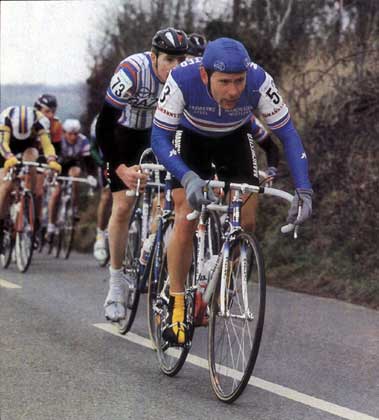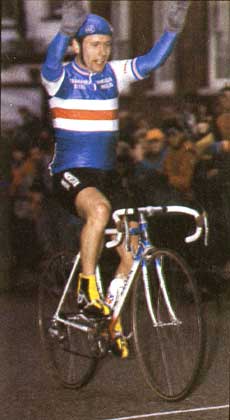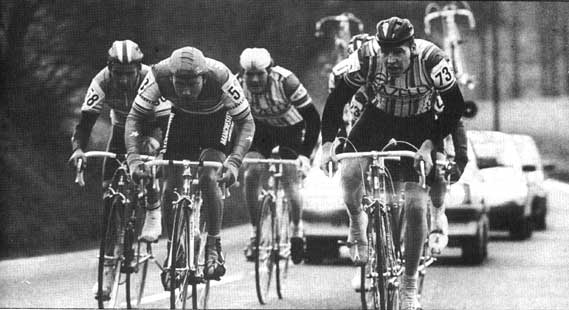|
|
 Paul
Curran (Manchester Wheelers-Trumanns Steel) broke away with five miles to go
to win the 34th Grand Prix of Essex on Sunday in a classic display of bike-riding.
Paul
Curran (Manchester Wheelers-Trumanns Steel) broke away with five miles to go
to win the 34th Grand Prix of Essex on Sunday in a classic display of bike-riding.
It was Curran's first visit to the race, and the Commonwealth Games road race champion could not be faulted in his approach to the race and the manner in which he executed his victory.
Second was his team mate Darryl Webster, one of the men of the race, with Karl Smith (Paragon RT) third.
 With
the largest "Essex" field ever - 91 starters from 100 entries - the
race got off to a lively start when Steve Farrell (GS Strada) took off with
Tim Schools (CC Bowland) at Bulmer Tye after six miles, with others getting
across to join them, only to be brought back.
With
the largest "Essex" field ever - 91 starters from 100 entries - the
race got off to a lively start when Steve Farrell (GS Strada) took off with
Tim Schools (CC Bowland) at Bulmer Tye after six miles, with others getting
across to join them, only to be brought back.
It was a windy, chilly sort of day, with no one quite sure where the wind was coming from as the race threaded its way through the twisting Essex lanes.
There were early casualties, Stuart Payne (Anglia Sport) having his wired-up tyre blow off the rim, then his team-mate Colin Bath changing a rear wheel when his sprockets fell off his block.
Trouble of a different kind befell Harry Lodge (Chiltern RC) who fell as the field turned into Castle Hedingham with 10 miles covered. With shorts torn, handlebars twisted, Lodge set off to regain the bunch, but his inexperience in using the race convoy - or was it his time trialling instincts? - took him a long time to get back.
 Schools
was in action again, breaking away near Finchingfield, to be chased by Charlie
Williamson (Poly CC), but the long, strung-out field soon had them back again.
Schools
was in action again, breaking away near Finchingfield, to be chased by Charlie
Williamson (Poly CC), but the long, strung-out field soon had them back again.
Another break went, and in it were Eamonn Rooney (Alpha RC) - winner at Aintree - Karl Smith (Paragon RT), Mark Gornall (Manchester Wheelers), Nigel Smith (Clayton Velo), and Nigel Bishop (Manchester Wheelers). They were soon joined by David Rayner (Bradford Wheelers), Steve Rigby (Dinnington RC) and Glenn Longland (Antelope RT) - last year's BBAR time trial champion.
The break looked good, too good for six other riders: Curran, Lodge, Geoff Platts (Charnwood CRC), David Spencer (Paragon RT), Andrew Chapman (Featherstone RC), and Greg Newton (Paragon RT), who set off in pursuit with Norman Dunn (Ferryhill Wheelers), Glenn Sword (Kirkby CC) and Phil Bateman (Chesterfield Coureurs) forming a second chasing group.
There was now 44 seconds between the break and the six chasers, with the second chasing group closing in on their quarry. Soon, all three groups merged, and the decisive break had been made.
The break, now swelled to 17, had a 1-30 lead by White Colne, but Sword was having trouble in keeping up with them. They were now in the hilly part of the course, teasing hills with false summits, with the road dipping and climbing, twisting and winding, not the sort of terrain when you are going through a bad patch.
A tremendous chase had been set up by Manchester Wheelers' team mates Darryl Webster and Rob Holden from the bunch, and a savage two-up team time trial brought them to the leaders.
Into narrow lanes and switchback hills at Pebmarsh, where Holden's luck ran out. After his tremendous pursuit with Webster, he punctured his rear wheel, and as he climbed off his bike, so Rooney launched a vicious attack from the break.
Rooney was chased by the whole bunch, not relishing a repeat performance from the Aintree winner, with Longland doing the work at the front of the bunch, while the rest let him do so.
Holden made it back to the bunch, his luck had changed again, but there were more attacks to come. As the bunch began to twitch, so Webster attacked, but was brought back.
The impetuosity that characterises Webster, showed again, for tried to break away again, this time successfully but having to take Karl Smith and David Rayner with him.
The ferocity off the attack split the original break into three, with Rigby leaving them for good.
The Webster trio were joined by Spencer, Curran and Platts, with Bishop, Rooney and Nigel Smith the new chasers, leaving Newton, Longland, Dunn, Gornall, Holden and Wayne Randle (Chesterfield Coureurs) as the second chasing group.
There were 73 riders left in the race, with 18 calling it a day. This race was proving to be the toughest for some years.
Bishop, Rooney and Nigel Smith were caught by the Newton group as the race neared Halstead for the last of the big loops and the commencement of the three 10-mile circuits that would close the race.
Sixty miles had been covered as the race climbed Halstead's Market Hill, with Webster reaching the summit first, then trying to extend his lead for a possible breakaway. No one was falling for that trick, and his five companions, loath to let him go, welcomed him back instead.
The break stayed together for the next two circuits, their lead hovering around a minute and minute-and-a-half. It was down to six men as the bell sounded for the last lap, but who would the winner be?
Webster soon made up his mind, as he jumped hard on the right-hand side of the road, preferring to go it alone for the victory instead of trusting his luck to a six-man uphill sprint.
His ambition was soon unfulfilled as he was swiftly brought back. It was the perfect time to launch a counter-attack, said Doug Dailey, the national road coach.
As Dailey proffered that unheard advice, so Curran obliged. He gained 50 yards, with Platts and Rayner chasing, and Webster sitting in.
Curran in full flight is a joy to watch. He rode easily, hands on the top of the bars, breathing in large lungfulls of good Essex air, yet steadily pulling away as the miles ticked by.
As he left the Braintree road to head for Halstead, he was 22 seconds up. A couple of miles later it was 29 seconds. Now Curran got down on the drops and began his bid for victory. He climbed steadily and with economy - no wasted effort here. He stopped looking round to see where his pursuers were, unaware that a chasing bid by Spencer and Rayner, had been snuffed out by Webster and Karl Smith.
Curran was received by generous applause by the usual large crowd clinging to the pavements and looking out of the window of the bar in the White Hart at the top of Halstead's Market Street. It was his first Grand Prix of Essex win and his second victory of the new season.
"My calves were feeling funny today," Curran said. "I went walking yesterday in flip-flops and I wasn't climbing too well. This race has always been too early for me, but I had to ride to get some early points for the Star Trophy. I won't be riding the Wincanton Wheels as I will be riding in Italy."
Webster had provided the impetus for Curran to spring a Manchester Wheelers
counter-attack. Was it planned?
"Curran is a clever rider, that's all I want to say, quote, unquote,"
said Webster. "I'm quite pleased however, as I only arrived back from training
in Spain yesterday."
1. PAUL CURRAN (Manchester Wh-Trumanns Steel) 91m
in 3-36-7
2. D. Webster (Manchester Wh) at 39sec
3. K. Smith (Paragon RT) at 40sec
4. G. Platts (Charnwood CRC) at 4lsec
5. D. Spencer (Paragon RT) at 1-5
6. D. Rayner (Bradford Wh) at 1-8
7. N. Smith (Clayton Velo) at 3-26
8. E. Rooney (Alpha RC)
9. G. Newton (Paragon RT)
10. M. Gornall (Manchester Wh) all st
11. W. Randle (Chesterfield Cour) at 3-28
12. R. Holden (Manchester Wh) st
13. P. Bateman (Chesterfield Cour) at 3-30
14. N. Dunn (Ferryhill Wh) st
15. N. Bishop (Manchester Wh) at 3-35
16. T. Stevens (34 Nomads) at 3-55
17. N. Miller (Dinnington RC)
18. A. Hitchens (Mid-Devon RC) both st
19. N. Hughes (Rhos-on-Sea CC) at 3-59
20. B. Smith (Scotland) at 4-23.
REPORT DENNIS DONOVAN PICTURES STEWART CLARKE